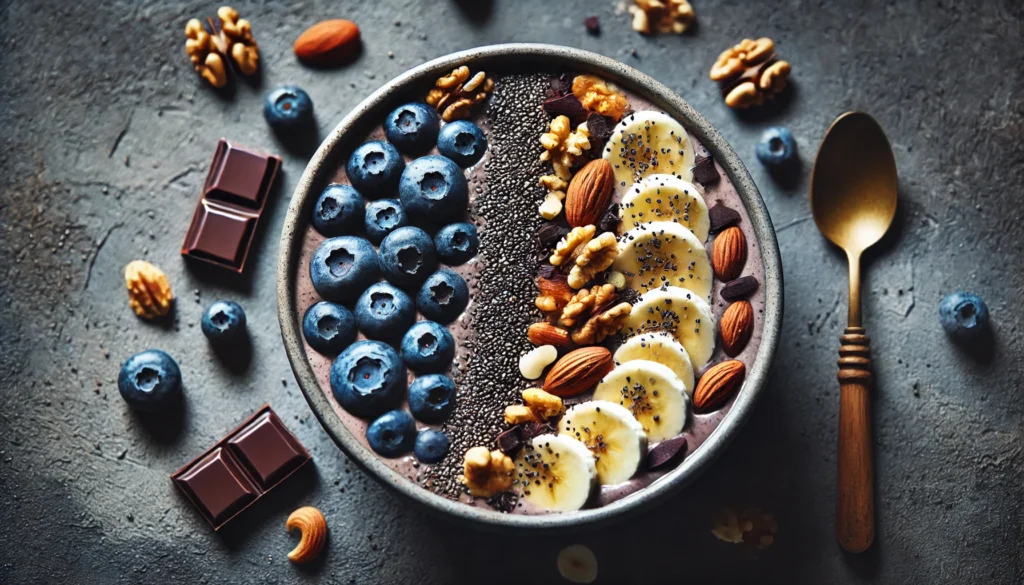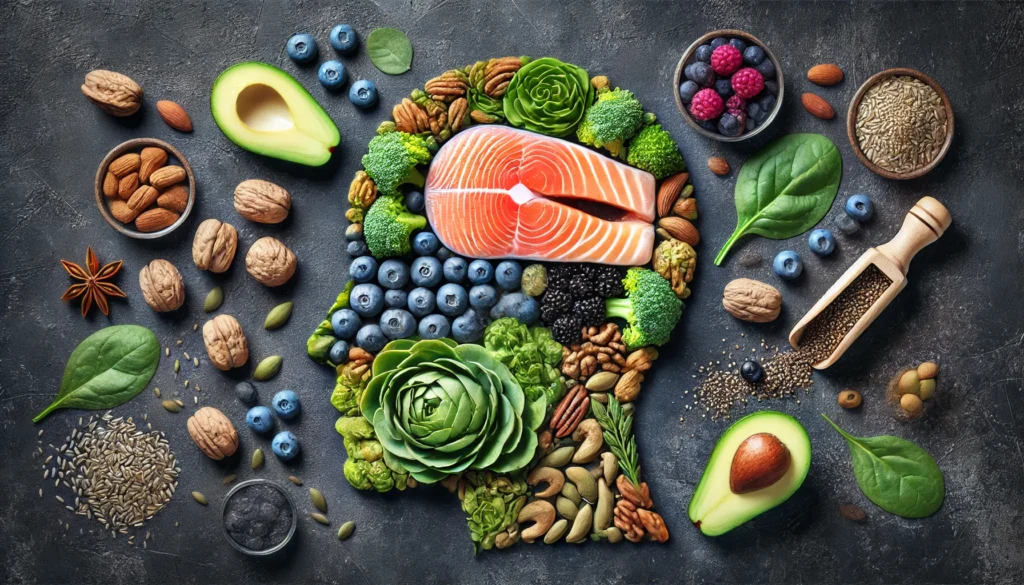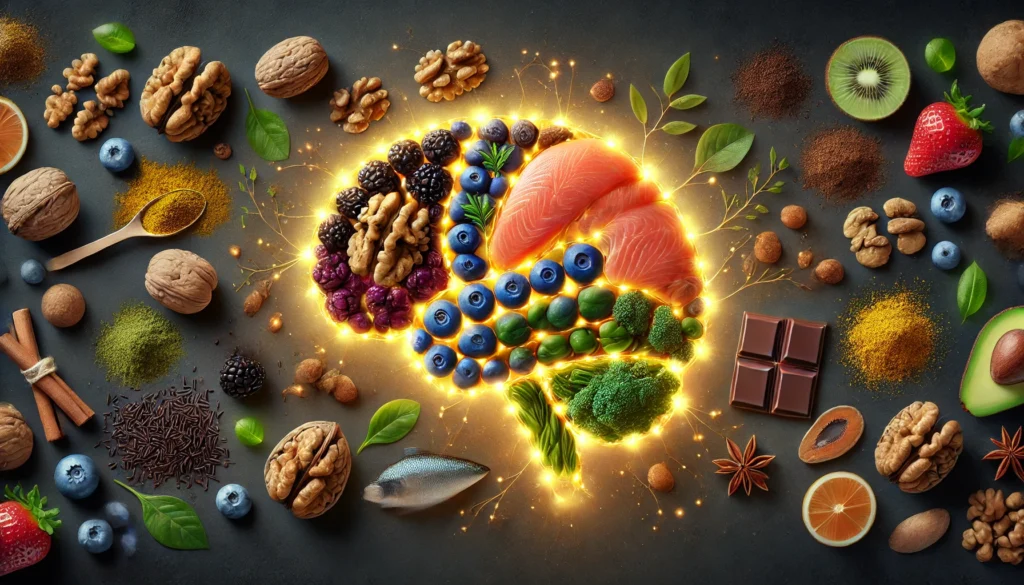The human brain is a marvel of biological engineering, an intricate organ responsible for cognition, memory, decision-making, and overall mental function. Given its complexity, the brain requires proper nourishment to maintain optimal performance throughout life. Diet plays a crucial role in supporting brain health, influencing cognitive function, focus, and long-term neurological resilience. Research has demonstrated that certain foods, often referred to as “brain foods,” provide essential nutrients that promote focus, enhance memory, and even support longevity. Understanding the link between diet and the brain is essential for those seeking to optimize mental performance and cognitive well-being.
You may also like: How to Improve Focus and Concentration: Proven Techniques for Boosting Mental Clarity and Productivity
The Connection Between Nutrition and Brain Function
Nutrition is fundamental to brain function. Every cell, neurotransmitter, and synapse in the brain depends on specific nutrients to function properly. The foods we consume supply these vital nutrients, impacting brain activity at the molecular level. Diet influences neurotransmitter production, inflammation, oxidative stress, and neurogenesis, all of which play critical roles in cognition and mental clarity. Deficiencies in key nutrients have been linked to cognitive decline, memory impairment, and neurodegenerative diseases such as Alzheimer’s and Parkinson’s.
Several essential nutrients support brain function. Omega-3 fatty acids, found in fatty fish and nuts, help build cell membranes in the brain and play a crucial role in neuron communication. Antioxidants from fruits and vegetables combat oxidative stress, reducing cellular damage. B vitamins contribute to energy metabolism and neurotransmitter production, while amino acids from protein-rich foods support the synthesis of dopamine and serotonin, neurotransmitters essential for mood regulation and concentration. A diet rich in these nutrients can enhance mental agility and protect against age-related cognitive decline.

The Best Brain Foods for Cognitive Function
Several foods stand out for their ability to enhance cognitive function and mental performance. These foods supply the brain with critical nutrients, ensuring efficient neurotransmitter activity, optimal blood flow, and cellular protection against oxidative damage.
Fatty Fish: A Source of Omega-3s
Fatty fish such as salmon, mackerel, and sardines are among the best brain foods due to their high concentration of omega-3 fatty acids. Omega-3s, particularly DHA (docosahexaenoic acid), are crucial for brain cell structure and function. Research has shown that individuals with higher levels of omega-3s in their diet tend to have better cognitive performance and a reduced risk of neurodegenerative diseases. These fatty acids help reduce brain inflammation, enhance synaptic plasticity, and support the formation of new neuronal connections.
Blueberries: Antioxidant Powerhouses
Blueberries are packed with antioxidants, including flavonoids, which have been shown to improve memory and protect against cognitive decline. These antioxidants combat oxidative stress, reducing brain inflammation and preventing cellular damage. Studies suggest that regular consumption of blueberries can improve brain function, enhance communication between brain cells, and delay age-related cognitive impairment. The polyphenols in blueberries also promote neurogenesis, the growth of new neurons, which is vital for learning and memory.
Nuts and Seeds: Brain-Boosting Nutrients
Nuts and seeds, particularly walnuts, almonds, and flaxseeds, are excellent sources of healthy fats, antioxidants, and vitamin E. Vitamin E is known for its role in protecting brain cells from oxidative stress. Walnuts, in particular, contain high levels of DHA, making them one of the best brain foods for focus and memory enhancement. Additionally, these foods provide magnesium and zinc, essential minerals that support neurotransmitter function and cognitive performance.
Dark Chocolate: A Cognitive Enhancer
Dark chocolate contains flavonoids, caffeine, and antioxidants, all of which can improve brain function. Flavonoids in cocoa have been shown to enhance blood flow to the brain, improving cognitive function, memory, and attention. Additionally, dark chocolate stimulates the release of endorphins and serotonin, neurotransmitters that elevate mood and mental clarity. A moderate intake of dark chocolate has been associated with improved cognitive performance and reduced risk of neurodegenerative diseases.
Leafy Greens: Essential Vitamins and Minerals
Leafy greens such as spinach, kale, and Swiss chard are rich in folate, vitamin K, and beta-carotene. These nutrients are essential for brain health and have been linked to slower cognitive decline. Folate plays a critical role in neurotransmitter synthesis, while vitamin K supports brain cell integrity. Regular consumption of leafy greens has been associated with improved memory retention and mental sharpness.
How Diet Affects Focus and Alertness
The foods we eat directly impact our ability to concentrate, stay alert, and process information efficiently. Certain foods can stabilize blood sugar levels, promote neurotransmitter activity, and enhance mental endurance, allowing for sustained focus throughout the day.
Consuming protein-rich foods such as eggs, lean meats, and legumes provides essential amino acids that boost dopamine production, improving motivation and attention. Whole grains, such as oats and quinoa, release glucose gradually, providing a steady energy supply to the brain. On the other hand, refined sugars and processed carbohydrates cause rapid spikes and crashes in blood sugar, leading to brain fog and decreased concentration.
Foods That Promote Longevity and Brain Health
A diet that supports brain function also contributes to longevity. Certain foods contain compounds that protect against age-related neurodegeneration and promote long-term cognitive health. The Mediterranean diet, rich in whole foods, healthy fats, and lean proteins, has been extensively studied for its brain-protective effects. Foods such as olive oil, avocados, and berries contain antioxidants and anti-inflammatory properties that support cellular health and prevent cognitive decline.
Green tea, a beverage rich in catechins and L-theanine, has been shown to enhance brain function while reducing stress. Its neuroprotective properties help prevent the accumulation of beta-amyloid plaques, which are linked to Alzheimer’s disease. Additionally, fermented foods such as yogurt and kimchi support gut health, which in turn influences brain function through the gut-brain axis.

Frequently Asked Questions (FAQ) About Brain Foods for Focus, Memory, and Longevity
1. What are the best brain foods to improve focus and concentration?
The best brain foods to enhance focus and concentration include fatty fish, blueberries, nuts, seeds, and dark chocolate. These foods contain essential nutrients like omega-3 fatty acids, antioxidants, and vitamin E, all of which support cognitive function and mental clarity. Fatty fish, in particular, supplies DHA, which strengthens neural connections and enhances neurotransmitter efficiency. Dark chocolate contains flavonoids and caffeine, helping to improve concentration and sustain mental energy. Incorporating these foods into your daily diet can optimize brain function and help maintain sustained attention throughout the day.
2. How does diet affect focus and mental alertness?
A well-balanced diet directly impacts focus and mental alertness by providing essential nutrients that fuel brain activity. Consuming brain food snacks like almonds, yogurt, and whole grains ensures a steady release of glucose, preventing energy crashes that lead to mental fatigue. Foods rich in protein, such as eggs and lean meats, support dopamine production, which is crucial for motivation and cognitive engagement. Hydration also plays a significant role; even mild dehydration can impair attention and slow down cognitive processing. Eating a diet rich in brain-nourishing foods helps stabilize blood sugar levels and sustain mental performance throughout the day.
3. What are some brain foods that promote longevity and cognitive health?
Brain foods that support longevity and cognitive health include leafy greens, nuts, olive oil, and berries. These foods contain antioxidants and anti-inflammatory compounds that protect neurons from oxidative stress and reduce the risk of neurodegenerative diseases. The Mediterranean diet, which emphasizes these foods, has been linked to a lower risk of Alzheimer’s disease and improved long-term brain function. Regular consumption of brain-healing foods such as walnuts and avocados also contributes to improved memory retention and reduced cognitive decline. Ensuring a diet high in these nutrient-rich foods helps maintain brain resilience as you age.
4. Can eating the right foods actually make you smarter?
While no food can instantly boost intelligence, certain brain foods can enhance cognitive function and improve learning ability. Foods rich in choline, such as eggs, support neurotransmitter activity, which plays a key role in memory and learning. Omega-3 fatty acids from fish and flaxseeds help with brain development and improve neural plasticity, essential for acquiring new knowledge. Whole grains and legumes provide a steady supply of energy, helping sustain mental endurance during complex problem-solving tasks. Regularly consuming foods that help you focus and retain information can significantly enhance cognitive performance over time. A nutrient-rich diet lays the foundation for sustained brain health and improved intellectual capacity.
5. What are the best snacks to improve focus during studying or work?
Snacks to improve focus should be rich in protein, healthy fats, and complex carbohydrates to provide lasting energy. Brain food snacks such as walnuts, Greek yogurt with honey, and dark chocolate with almonds supply essential nutrients without causing sugar crashes. Pumpkin seeds, which are high in magnesium and zinc, support neurotransmitter function, enhancing mental clarity and memory retention. Green tea, which contains L-theanine, helps maintain a state of calm focus, making it an excellent beverage choice during study sessions. By choosing the right snacks, you can sustain concentration and improve productivity throughout the day.
6. What role do antioxidants play in brain function?
Antioxidants help protect the brain from oxidative stress, which can damage cells and contribute to cognitive decline. Foods high in antioxidants, such as berries, spinach, and dark chocolate, neutralize free radicals that cause cellular damage. This protection supports brain nourishment by maintaining the integrity of neurons and promoting healthy brain aging. Research has shown that diets rich in antioxidants improve memory and delay cognitive decline in older adults. Including a variety of antioxidant-rich foods in your daily meals can enhance mental clarity and long-term brain health.
7. Are there specific brain foods that are especially beneficial for seniors?
Yes, certain brain foods for seniors are particularly beneficial in supporting cognitive function and reducing the risk of dementia. Foods rich in vitamin B12, such as salmon and dairy products, help maintain nerve health and prevent cognitive decline. Leafy greens, which contain folate and vitamin K, have been linked to slower cognitive aging. Nuts and seeds provide healthy fats that reduce inflammation in the brain, while berries offer polyphenols that support memory retention. Maintaining a diet rich in these brain-supporting nutrients helps older adults sustain mental sharpness and overall well-being.
8. How does food impact brain development in children and young adults?
Brain development relies on adequate nutrition, particularly during childhood and adolescence when neural pathways are rapidly forming. Foods rich in omega-3s, such as fish and walnuts, are essential for brain cell growth and function. Iron-rich foods, including spinach and lean meats, support oxygen transport to the brain, improving concentration and cognitive performance. Whole grains and dairy products provide steady energy, helping young minds stay engaged during school and learning activities. A well-balanced diet filled with nutrient-dense brain foods promotes healthy brain development and sets the stage for lifelong cognitive function.
9. Can certain foods help prevent cognitive decline and neurodegenerative diseases?
Yes, diets rich in brain-healing foods can help reduce the risk of cognitive decline and neurodegenerative diseases like Alzheimer’s and Parkinson’s. Foods that promote focus and brain longevity, such as turmeric, green tea, and extra virgin olive oil, contain compounds that fight inflammation and oxidative damage. Fermented foods like kimchi and kefir support gut health, which is closely linked to brain function through the gut-brain axis. Regular consumption of these foods enhances neuroprotection and helps maintain cognitive resilience with age. Adopting a diet that prioritizes these brain-boosting foods is a proactive approach to preserving mental clarity.
10. What are some practical ways to incorporate brain foods into your daily diet?
Incorporating brain foods into your daily diet can be simple and enjoyable with a few mindful choices. Start your day with a smoothie made from berries, spinach, and walnuts for a nutrient-rich breakfast. Opt for brain food snacks like a handful of almonds or a boiled egg instead of processed snacks to sustain focus. Add fatty fish to your weekly meals and use olive oil for cooking to ensure a steady intake of healthy fats. Swapping refined carbohydrates for whole grains helps maintain stable energy levels and prevents cognitive fatigue. By making small adjustments to your diet, you can enhance brain nourishment and optimize cognitive function every day.

Conclusion: The Power of Brain Foods
Incorporating brain foods into your diet is a powerful strategy for enhancing cognitive function, improving memory, and promoting longevity. Nutrient-dense foods such as fatty fish, blueberries, nuts, and leafy greens provide essential vitamins, minerals, and antioxidants that support mental clarity and protect against age-related cognitive decline. Understanding how diet affects focus and brain health allows individuals to make informed choices that optimize their mental performance and overall well-being. By prioritizing foods that nourish the brain, it is possible to maintain sharp cognitive function and support lifelong neurological health.
brain-boosting nutrition, cognitive health diet, foods for mental clarity, brain-supporting nutrients, memory-enhancing foods, neuroprotective diet, superfoods for the brain, cognitive function support, smart eating for focus, mental performance foods, diet for brainpower, foods for sharper thinking, brain cell regeneration diet, best foods for mental stamina, anti-aging brain nutrition, brain vitality foods, concentration-boosting diet, omega-3 rich foods for cognition, longevity and brain health, optimal diet for memory
Further Reading:
Best Foods for A Healthy Brain and Improved Memory
Foods linked to better brainpower
Brain foods: the effects of nutrients on brain function
Disclaimer
The information contained in this article is provided for general informational purposes only and is not intended to serve as medical, legal, or professional advice. While Health11News strives to present accurate, up-to-date, and reliable content, no warranty or guarantee, expressed or implied, is made regarding the completeness, accuracy, or adequacy of the information provided. Readers are strongly advised to seek the guidance of a qualified healthcare provider or other relevant professionals before acting on any information contained in this article. Health11News, its authors, editors, and contributors expressly disclaim any liability for any damages, losses, or consequences arising directly or indirectly from the use, interpretation, or reliance on any information presented herein. The views and opinions expressed in this article are those of the author(s) and do not necessarily reflect the official policies or positions of Health11News.


